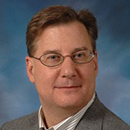May 2015

Thomas Ferkol, MD
I take pride in what the American Thoracic Society has accomplished this year. Our membership is diverse, which is the strength of the Society, and we expanded programs to encourage and promote our early career colleagues in their varied academic pursuits vital to our mission. The fruition of the ATS Academy has been particularly gratifying. We will name the first class of ATS Scholars and ATS Educators at the upcoming the ATS 2015 International Conference in Denver, recognizing our younger members who have either received awards or have been recognized by their own assemblies for their accomplishments in research or medical education. In addition, we invested even more funds into the ATS Foundation grants program to support young physician-scientists as they begin their careers.
I am pleased to see the culmination of our 110th anniversary in the Discoveries Series, which has given us the opportunity to do something truly different. The ATS journals and ATS 2015 International Conference have coordinated their efforts to highlight many of the advancesin patient care and research in adult and pediatric pulmonary, critical care, and sleep medicine. The ATS Discoveries Series is a new collection of articles and talks that features major scientific and clinical breakthroughs, which have changed the lives of the patients we treat, as told by leading scientists and clinicians. The program allows us to highlight where we have been and what we have achieved, but more important where we are going, which will have the greatest value to the practice of medicine.
The American Thoracic Society is a truly global organization, which quickly becomes apparent after you join the Executive Committee. Consequently, I have been on the road quite a bit this past year, visiting with our many partners, including the Japanese Respiratory Society, British Thoracic Society, Canadian Thoracic Society, Chinese Association of Chest Physicians, Asian Pacific Society of Respirology, Brazilian Thoracic Society, and Turkish Thoracic Society, to name just a few. Our visits have helped to further cement these friendships.
From these experiences, I am more confident than ever that the voice of many is more powerful than the voice of one, as evidenced by the Forum of International Respiratory Societies (FIRS), of which the American Thoracic Society is a founding member. The Forum is comprised of the leading international respiratory societies and together enhances our efforts to improve global lung health. This collaboration led to our invitation to the United Nations High-Level Review on the Prevention and Control of Non-communicable Diseases, and we continue our work with the Forum and the Non-communicable Disease (NCD) Alliance to reduce the burden of pulmonary diseases worldwide.
We have also made great strides in increasing our visibility, which we have accomplished by coordinating our communications efforts, upgrading our website, increasing our social media activities, and producing an annual report. All of these initiatives tell our story much more efficiently and effectively than we have in the past.
We still have many opportunities. It is clear to me that the greatest challenge to our field is the shrinking number of individuals who are interested in pursuing academic careers worldwide. Whether you are talking about individuals who are entering a career as physician-scientists or educators teaching tomorrow’s leaders, thus defining the course of the next generation of physicians and other health professionals, the numbers are worrisome. With fewer entering pulmonary research, who will make the discoveries that will lead to scientific breakthroughs and novel treatments for children and adults with lung diseases? Without teachers, who will train the next generation and allow them to understand the many opportunities that exist in research? Who will advocate for the patients we treat? It is a threat that we must address.
I hope that the ATS Academy and a new initiative, ATS Global Scholars, which will be introduced by President-Elect Atul Malhotra, MD, at ATS 2015, will begin a larger effort to draw the best and brightest into our fields. These programs are early but necessary steps in the right direction.
It’s been a great year, and I would recommend this experience to anyone. Even though my tenure as president is ending, I still have responsibilities to the Executive Committee and the Board of Directors, if only to provide “institutional memory.” The transition will be smooth. Indeed, many of Atul’s plans and goals for this year build on our recent efforts. They are all really quite laudable, and I look forward to what the future will bring.

